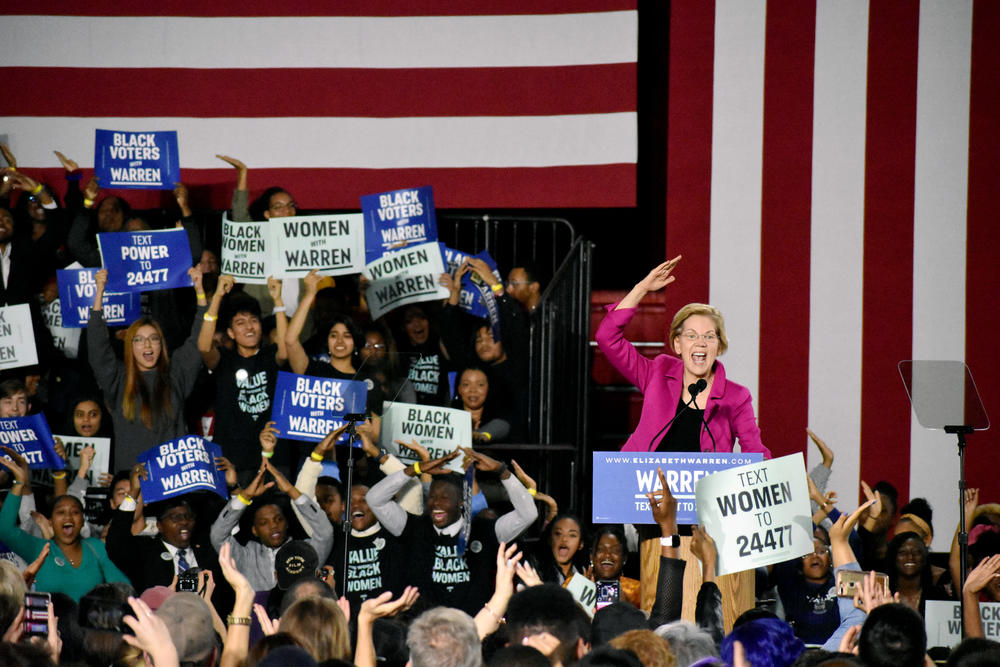Section Branding
Header Content
Elizabeth Warren Pays Homage To Black Women In Atlanta Speech
Primary Content
Massachusetts Sen. Elizabeth Warren delivered a speech dedicated to the history of black women in politics as she seeks to increase support after Wednesday’s primary debate.
In a gym on the campus of Clark Atlanta University, the presidential candidate was welcomed by Congresswoman Ayanna Pressley, a fellow Massachusetts Democrat.
“[Warren] knows that we live in nuance and intersectionality,” Pressley said to an enthusiastic crowd. “She is not just a great teacher, she is a student of the people… She has spent her life studying systems of oppression, to dismantle them.”
The crux of Warren’s speech revolved around making sure, “the lessons of black history will not be lost.”
“As a white woman, I will never fully understand the discrimination, the pain, the harm that black Americans have experienced,” she said. “I’m not here tonight to tell you about a painful history that black Americans have experienced and know all too well.”
The speech was disrupted early on by a group of protestors known as the Powerful Parent Network shouting “Our voice! Our choice!” in reference to Warren’s policy on charter schools and education. The rest of the crowd tried to drown them out with chants of “Warren! Warren!”
Pressley took the mic to address the protestors. “No one is here to quiet you – least not this black woman who knows what it is when people have tried to put me in a corner and tell me to be silent,” she said. “You are welcome here.”
The main story Warren wanted to share is of a strike that black washerwomen organized in Atlanta in 1881.
“They continued this work for $1 a day,” she said. “They worked and they worked, and the cycle continued... the pay was so meager that a family that depended only on the wages of a woman lived at the bare edge of survival.”
Warren said that the rich and powerful in this country don’t want people of different backgrounds to come together and support each other.
“Black History teaches us how to stand up when you're told to sit down,” she said. “Black History teaches us how to speak out when we're told to be silent. Black History teaches us how to march on, even when the road gets rough. And now, more than ever, all of us have to embrace the lessons of black history.”
Equally as prominent as her acknowledgement of the work black women have done in politics and organizing over the years was her directives to white voters unsure of how to process what it means for them.
“The wealthy and the well-connected want us to believe that more for your neighbors has always meant less for you,” she said. “But the truth is, when we come together, we can all move forward.”
A Democratic campaign event in Atlanta this week would be remiss without a reference to former gubernatorial nominee Stacey Abrams, who narrowly lost the election last year in a pitched battle over voting rights and access to the polls.
“And right now, our democracy is broken,” Warren said. “How do I know? Because Brian Kemp is sitting in Stacey Abrams’ chair.”
Warren said that voter suppression is another relic of the Jim Crow era and, surprise – she has a plan for that.
It starts with restoring the Voting Rights Act and includes outlawing partisan gerrymandering of voting districts and overturning the Citizens United campaign finance decision.
Warren commanded the crowd’s attention and support by speaking about issues ranging from black trans women’s rights, reproductive rights and legalizing marijuana.
She closed by arguing that what the country needs is persistence and that if supporters “dream big, fight hard and win,” then the country will improve.
“The persistence of generations of black women, and black people in America, up to and including many people in this crowd tonight, that is the true story of American persistence,” she said. “This is a moment in our history when that persistence can change the lives of every American for the better.”


